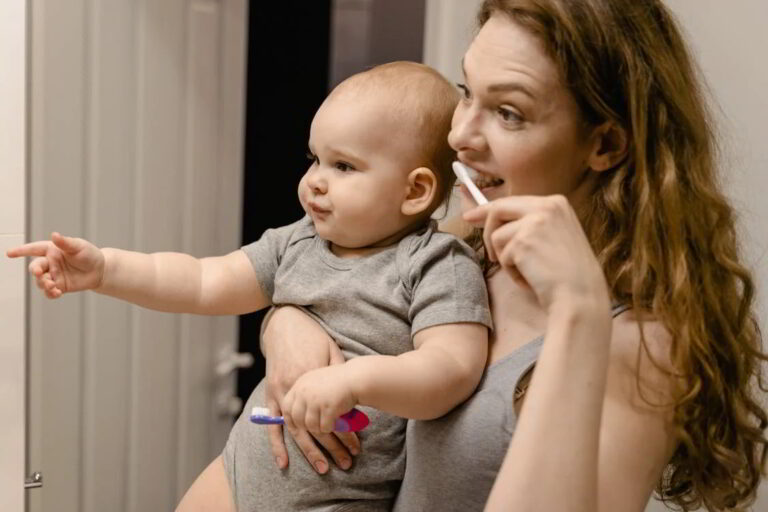How Do I Care for Baby Teeth and Gums?
Recently, we’ve been talking a lot about how pregnancy affects our teeth and our oral health, but what about afterwards when your new bundle of joy is finally here? This week, we’ll be looking at how best to care for your baby’s precious teeth and gums and answering all your questions.
How Old Should I Start Brushing My Baby’s Teeth?
You should start to brush your baby’s teeth as soon as their first tooth begins to erupt from the gumline.
How Do I Brush My Baby’s Teeth?
First, sit your baby on your knee with their head resting on your chest – the closeness will help your child to feel relaxed during the toothbrushing process. You should brush baby teeth using a small, soft toothbrush and a tiny smear of toothpaste. It might be tough going at first, as your child may not like the feeling of having their teeth brushed. Keep gradually brushing your child’s teeth more often until they get used to the sensation and allow you to brush their teeth twice daily.
After teeth brushing in the evening, remember to only give your child plain water or breast milk. Do not give them any foods with high sugar content which will sit on their teeth overnight and cause tooth decay.
When Should My Baby Start Seeing A Dentist?
Your baby should start seeing a dentist as soon as their first tooth appears, but it is often best to get your child used to the dentist before that. Bring your child with you to your own dental appointments and sit them on your knee so they get used to the sights, smells, and sounds in a dental office. When children come to the dentist for their own appointments, they usually get upset because it is a new, strange place – but if they have been to the dentist already with you, they know there’s nothing to be scared of and their appointment will be much easier for both you and baby!
Children are eligible for free dental care on the NHS, and mothers for the first year after birth. If you are having trouble accessing an NHS dentist, our SynPlan monthly payment plan allows parents to register 2 children on their plan free of charge.
Will A Dummy Affect My Child’s Teeth?
Dummies are completely fine for a child up to the age of 12 months, after which point they may begin to affect your child’s oral development, as their teeth will move to make space for the dummy, resulting in an open bite. Other activities such as sucking their thumb and biting their nails in older children can also cause their teeth to grow incorrectly and should be discouraged.
What High-Sugar Foods Should I Avoid Giving My Baby?
We all want to make sure our children are getting the best diet possible. When you’re blessed with a child who loves fruit, it makes life easier – but certain foods may be damaging your child’s teeth.
Limit fruits and fruit juices to being part of a meal, when saliva production is already triggered and will help to protect your child’s teeth from harmful sugar content. Stick to natural, organic fruits and limit juices to only one glass (150ml) per day as part of your child’s 5 a day. You should be wary of processed foods like fruit pouches and fruit bars, as these often contain high levels of processed sugar. Learn to read food labels and understand what is in your food and your baby’s food to avoid sugars.
You can also cut down on sugar intake by replacing sweets as a reward for good behaviour and asking friends and family to do the same. Instead of rewarding toddlers and young children with sweets, cakes, or biscuits, reward them with fun activities, stickers, colouring crayons etc.
As always, if you have any concerns about your teeth or your baby’s teeth, you can call us or visit your local Synergy practice.
Source:
https://www.nhs.uk/conditions/baby/babys-development/teething/looking-after-your-babys-teeth

